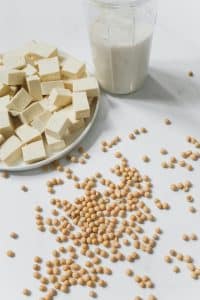 At Iron Fit in San Antonio, TX, we help clients with both nutritional information and an exercise program. One important part of providing the nutrients for building muscles is making sure you have adequate protein. For those who choose a more plant based diet, it can be more difficult to get the quality of complete proteins unless you have careful planning. What are good plant protein sources? Soy is one of the options that is often named as a top source of protein.
At Iron Fit in San Antonio, TX, we help clients with both nutritional information and an exercise program. One important part of providing the nutrients for building muscles is making sure you have adequate protein. For those who choose a more plant based diet, it can be more difficult to get the quality of complete proteins unless you have careful planning. What are good plant protein sources? Soy is one of the options that is often named as a top source of protein.
Soy is extremely versatile.
There are a lot of ways to get soy into your diet. You can use soy milk, opt for tempeh, tofu, natto, miso or use soy protein powder as an alternative protein source. Soy adds more than just protein to your diet. It has many vitamins and minerals, as well. Edamame, whole soybeans, have even become a favorite snack food. Like animal milk, soy milk is made into cheese like spongy curds, called tofu. Tofu is versatile and often used for extra protein at a meal.
The soy products you choose makes a difference.
Soy is generally a good source of protein, though the specific nutrient makeup depends on the form. For instance, soy protein isolate has much more protein per serving than tofu or soy milk. Traditional uses of soy, such as miso, tempeh, edamame, natto and miso are minimally processed compared to protein powders from soy. A half cup of firm calcium-set tofu has 22 grams of protein compared to 8 grams of protein in soy milk.
Soy is a good source of protein, but not the best.
While soy protein is a complete protein and a good choice for people who opt for a plant based lifestyle, it’s not necessarily the best protein if you want to boost your protein intake. A cup of milk made from soybeans has 8 grams of protein as noted previously. That’s the same amount of protein in a cup of cow’s milk, but you don’t get the same benefits from it if you’re building muscle. Soy isn’t as bioavailable, digestible or has the same muscle building capacity. It does contain methionine and lysine, necessary for muscle building, but not as significant amounts as animal protein sources. For building muscles, focus more on animal products like those with whey protein or casein.
- Soy does have other benefits. Soy outshines red meat when it comes to reducing the risk of coronary heart disease, type 2 diabetes and cancer. It’s linked lower LDL and triglyceride levels. The phytoestrogens in soy may be the reason for that.
- Soy protein may also help you lose weight easier and benefit your blood glucose levels. Due to many of the nutrients, it’s also known for reducing the risk of chronic disease.
- You’ll get a wide variety of nutrients from consuming soy protein. It’s higher in calcium, iron, magnesium, potassium, zinc and dietary fiber.
- People are often worried about consuming too much soy, due to fears of the phytoestrogens causing cancer, genetic modification or the antinutrients in soy that block the ability to absorb calcium, iron and zinc. If you eat a varied diet, there’s no evidence these fears are substantiated.
For more information, contact us today at Iron Fit San Antonio
